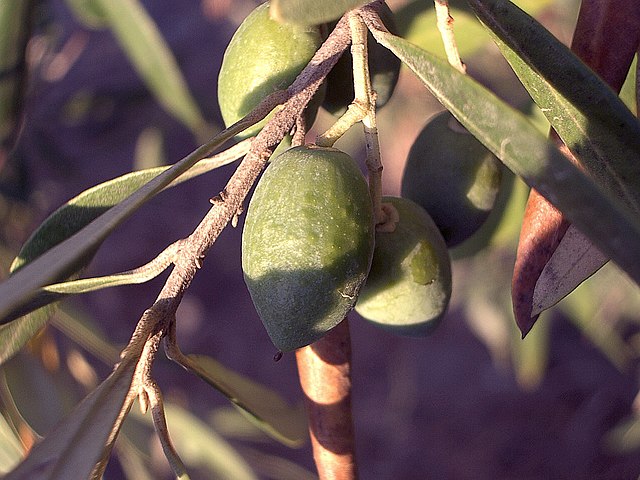Olive tree
olive plant, species of plant used as food From Wikipedia, the free encyclopedia
Remove ads
The olive tree is a small tree. Its scientific name is Olea europaea. A long time ago, it came from the coastal areas of the eastern Mediterranean, from Syria and the maritime (next to the sea) parts of Asia Minor and northern Iran at the south end of the Caspian Sea. It has been farmed for a very long time. The Ancient Greeks were farming it. They spread the trees to the western part of the Mediterranean.
This article does not have any sources. (July 2010) |




Olive trees like soil with lots of chalk in it. They grow best on limestone slopes and crags in coastal climate.
Remove ads
Overview
The Wild Olive is a small tree or shrub that grows up to 8–15 m tall with thorny branches. The leaves are opposite, 4–10 cm long and 1–3 cm wide. The leaves have a dark greyish-green color above and are pale with whitish scales below. The small white flowers, with calyx and corolla divided into four parts, two stamens and bifid stigma, are mostly on the last year's wood, in racemes coming up from the axils of the leaves. The fruit is a small drupe 1–2 cm long, thinner-fleshed and smaller in wild plants than in orchard cultivars.
Remove ads
Uses
Today, olive trees are grown for the following reasons:
- The fruit of the tree is used:
- For cooking. Directly from the tree the olive does not taste very good (it tastes very bitter). It is put into some liquid that makes it less bitter. When this is done, it can be used in many recipes of Mediterranean cooking.
- To make olive oil, a very important vegetable oil.
- The wood of the tree is very hard. It is used to make furniture or articles of everyday use.
- The leaves of the tree have some medical uses. It is said that the leaves have a calming effect. They are good for people going to sleep. They are also good for the immune system and to bring down high levels of cholesterol. The oil is good for the cardiovascular system (the heart, and the arteries, etc.) and the circulation of fat in the body.[2]
Remove ads
The numbers behind
In total, about 17.3 million tons of olives are produced every year. 60% of all olive trees are in the European Union. The top producers are:[3]
Cultural significance
Greece
Very probably, the first olive trees were grown in Syria.[source?] From there they spread rapidly. In Ancient Greece, the tree was considered to be holy. Some city states (polis) like Athens punished people for cutting down olive trees.
United Nations
The branches in the flag of the United Nations are those of an olive tree.
Christianity
In Christianity, the olive tree can be a sign of peace, because according to the Bible, a dove brought an olive branch to Noah to show that the flood was over.
Palestine
In Palestine the olive tree and plant carry the symbolic connotations of resilience, health, ancestral ties and community.[4][5] Researchers have found that the olive tree are tied into the Palestinian's Sutra, A’wana and Sumud.[6] The tree is a means of survival and security, represents their bond to their land, community, and animals.[4] Olive trees also serve as a symbol of their identities, which includes their physical and emotional aspects and their socio-cultural values.[4][6] Palestinian people view the olive trees as the first witnesses that Palestine is their homeland. [4]

The season harvest is referred to as, ‘Palestine’s wedding’ and is considered a national holiday where children and faculty members receive two days off school to join the harvest.[6] This holiday allows for community members to gather and serve as a ritual that encompasses their values surrounding family, labor power, community, and aid for other members of the community that do not possess land.[6] This is practice through the tradition of leaving fruit on a tree during the harvest so that those who do not have land and are unable to partake in the harvest can still reap the benefits.[6]
The symbolism connotation of resistance that is attached to the olive tree in Palestine comes from the displacement of Palestinian peoples.[4] During Nakba in 1948 many Palestinian people were displaced and there was a massive land loss that included the loss of olive trees.[7][5][6][4] Olives make up 25% of Palestine's economy as they use it to create oil, fuel, food and for medicinal products. In 1967 Israeli Defense Forces (IDF) had seized further land territories in the Gaza Strip and West Bank where majority of the olive trees are planted.[5][6] With new zoning, checkpoints, and illegal walls being build the labors had to seek permits to harvest their olive trees.[7][5][6] As a form of resistance, Palestinian people would plant olive trees to prevent Israeli forces from taking more land and this has shaped the new symbolism of resistance.[7][6]
Remove ads
References
Other websites
Wikiwand - on
Seamless Wikipedia browsing. On steroids.
Remove ads



